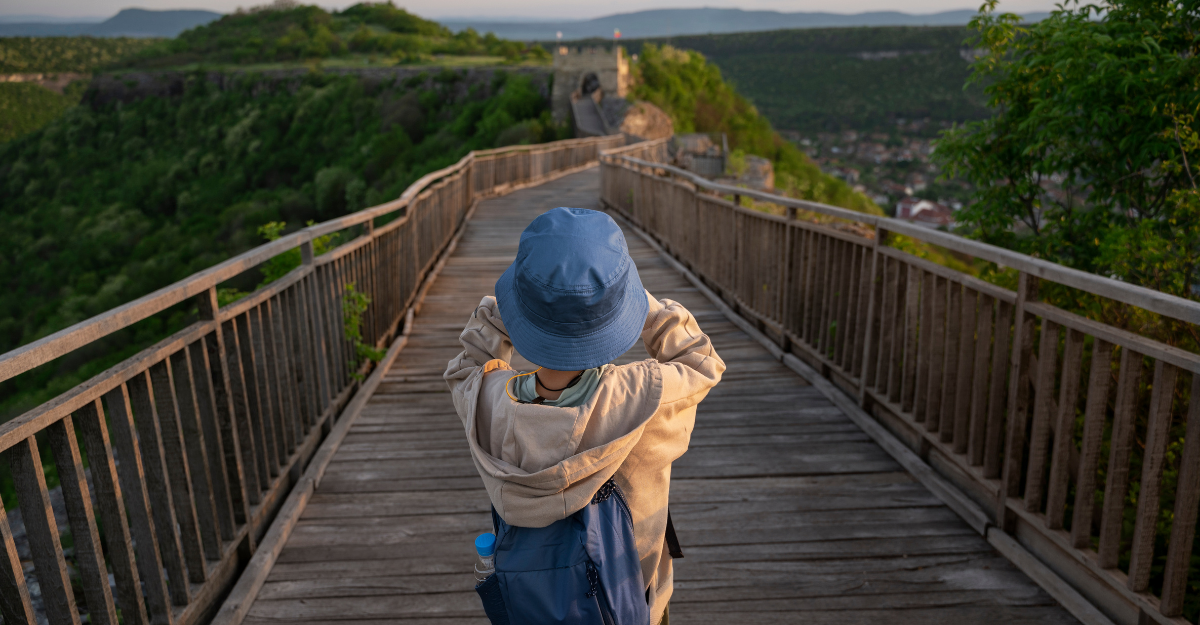
How Grief Tourism Is Helping People Deal With Loss: Stories Of Travellers Turning Loss Into Strength
In the stillness of a forest house on the Bihar-Nepal border, Anwiti Singh, a 31-year-old journalist, woke up to the sound of monkeys screeching and birds cackling. Outside her window, the mountains of Nepal glowed faintly under the morning sun, mist curling at their feet. It was the first time, in a year since her father’s death, that she felt something that resembled peace.
She had driven alone for nearly twelve hours through unknown roads, guided only by her father’s diary and a Google map. A man-eating tiger was reportedly on the loose nearby, but Singh wasn’t afraid. “I had his photograph in the passenger seat,” she recalled. “Everywhere I went, I held it. It felt like I was taking him on the trip he had always dreamed of.”
Her father had spent years planning to visit Valmiki Tiger Reserve, tucked away in the forests of West Champaran. He never made it. When he died in 2021, Singh carried not only the grief of losing him but the unfinished journey that had become his obsession. “So I went on it alone,” she said. “I went for him.”
Singh’s journey is one among many that capture a quietly growing phenomenon: grief tourism — or, as some prefer to call it, restorative travel. It’s the idea that travel can help people process loss by offering distance, silence, and a sense of renewal. It’s not about visiting tragic sites or chasing adrenaline; it’s about seeking spaces that hold your grief gently.
A Ticket to Healing
For Pooja Saha, a 31-year-old brand consultant from Delhi, the mountains have always been a refuge. But when she lost her cousin in a sudden accident, the hills became something else entirely.
“I tried everything; therapy, healing sessions, meditation,” she said. “Nothing worked. I felt cursed, like everyone I loved was slipping away.”
So she packed her bags and drove to Mukteshwar. That night, as rain lashed the mountain roads, she broke down. “I cried for hours,” she said. “Then I called a relative, showed him the sky full of stars, and we spoke about Pijush (her cousin) all night.”
1
2
3
4
The next morning, she visited the 350-year-old Mukteshwar Dham temple. “It was the first time I felt a quiet sense of release,” she said. That journey led her to Gangotri Dham, Harshil Valley, and eventually to Rishikesh, where she stayed for a month. “Every evening by the Ganga, the river roared so loudly that it swallowed my grief. I remember wishing it could carry my pain away with its current.”
She doesn’t believe the trips fully healed her. “You never stop grieving,” she said. “But the grief softened. It turned into something quieter, something I could live with.”
Don't miss: 7 Best Places To Experience Dark Tourism In India

The Psychology of Travel
Psychologists say there’s more to this than poetic coincidence. “Travel changes our environment, which in turn rewires our brain,” said Nishtha Kavita Grover, a psychologist based in Delhi. “When you’re grieving, you’re trapped in routine reminders of loss. A change in setting — especially one that stimulates the senses — helps the brain create new associations.”
Grief, she explained, is not just emotional; it’s biological. “The brain has neuroplasticity — the ability to form new neural pathways. Travel, especially symbolic travel like visiting a loved one’s favourite place, becomes a framework for meaning reconstruction. It’s not about moving on; it’s about moving forward with the memory.”
In psychology, this is known as “continuing bonds” — maintaining an emotional connection with the deceased in healthy, adaptive ways. “It’s a ritual of love,” Grover said.
Don't miss: 40+ Quotes on Grief From Celebrities, Leaders, Inspirational Speakers, And More To Help You Cope
A Pandemic of Loss
After the collective mourning induced by the pandemic, the idea of travel as therapy has found new resonance. “The pandemic fundamentally changed how we view travel and emotional well-being,” said Hemant Mediratta, founder and CEO of One Rep Global. “People are no longer travelling just to see things; they’re travelling to feel things.”
He prefers the term restorative travel to “grief tourism,” which he believes sounds voyeuristic. “It’s about choosing a place of quiet transformation,” he said. “Some find it in the mountains, others by the sea. The key is to find an environment that lets you just be — without performance or pressure.”
Mediratta has seen this shift firsthand: “Doctors and therapists now recommend ‘restorative breaks’ as part of healing plans. Nature, silence, and solitude can be deeply therapeutic.”
For ages, travel has been synonymous with luxurious vacations and a time for celebration, but rarely something negative like grief. But grief tourism is unique because travel is seen beyond its usual tropes—it's beyond the Instagram filters or stories of escapades, but crafted and tailored for one's needs, especially when they are going through something so tough.
Benefits of Grief Tourism
Hyderabad-based psychologist Archana Manhachery has seen her clients use travel to process loss. “Grief tourism is an intentional journey undertaken to process the emotional experience of loss, whether of a loved one, a relationship, or even a part of one’s identity,” she explained.
While hectic schedules and the general hustle of life often serve as a good distraction, it is not a recipe for healing. According to Manhachery, travel helps people sit with their thoughts and emotions, without trying to find a quick fix for them. It finally makes people address everything they've been feeling without all the rituals, greetings, and paperwork, which follow immediately after a death.
Manhachery further describes grief tourism as “a desire to be moved by the outer world in hopes of transformation within the inner world.” For some, the grandeur of a mountain range or the rhythm of the sea becomes a metaphor for impermanence. “It allows people to reengage with life and reignite hope,” she said. “But it’s not a cure. It’s a pause, a gentle integration of loss into life.”
That distinction is crucial. “Grief travel cannot erase pain,” said Manhachery. “It becomes unhelpful if used merely to escape. Eventually, the traveller must return to the quiet presence of longing and emptiness when the journey ends.”

Lessons from the Road
For 22-year-old PR professional, who chose to stay anonymous, the loss of her father when she was a child left an ache that surfaced again and again. “Travelling became my way to give that grief space,” she said. On one such journey to Rishikesh, she sat by the Ganges and spoke to her father in her thoughts. “It didn’t make the pain go away,” she said. “But I learned to sit with it. Healing is not forgetting — it’s learning to live gently with what you’ve lost.”
Another traveller, a 30-year-old Vice President from Delhi, echoed that sentiment. After losing his grandfather, whom he cared for a decade, he took off for Nainital. “It’s true what they say — out of sight, out of mind,” he said. “But more than that, I needed a break from the routine that reminded me of him every day. In Nainital, I learned that we have to let go of pain peacefully.”
All of them shared one warning: don’t travel alone. “Grief can make you vulnerable,” the Vice President said. “Always have someone who can hold space for you when the pain feels unbearable.”
Ultimately, grief tourism isn’t about geography. It’s about permission; to cry, to remember, to keep loving. As Ananya Shrivastava, a media entrepreneur who travelled to the hills after her mother’s death, put it: “Grief travel isn’t about running away from pain. It’s about finding a quiet space to feel it.”
Her words lingered like the echo of a hymn. “Zindagi nahi rukti,” she said. “Bas kuch khaali reh jaata hai.” Life doesn’t stop; it just continues with a little more emptiness. In that emptiness, perhaps, lies the beginning of peace.
Image courtesy: Freepik
For more such stories, stay tuned to HerZindagi.
Herzindagi video
1
2
3
4